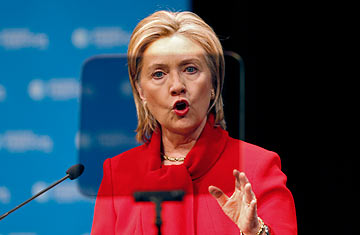
Secretary of State Hillary Clinton delivers remarks on internet freedom at the Newseum in Washington.
During the Cold War, Soviet bloc dissidents had to rely on primitive printing technologies to reproduce samizdat literature in tiny quantities. Today's dissidents living under authoritarian regimes around the world can disseminate their message world wide with the click of a mouse, through blog postings and viral videos. And, as Secretary of State Hillary Clinton announced in a recent speech, the United States plans to champion their cause by enabling unprecedented freedom of speech on the Internet, in defiance of all political censorship.
"While it is clear that the spread of [new communication] technologies is transforming our world, it is still unclear how that transformation will affect the human rights and human welfare of the world's population," noted Clinton. That's because "on their own, new technologies do not take sides in the struggle for freedom and progress, but the United States does; we stand for a single Internet where all of humanity has equal access to knowledge and ideas."
In the U.S., the notion of unfettered access to communications is so uncontroversial as to seem almost trite, but it is a revolutionary demand in countries such as Iran and China where it threatens the regimes' hold on power. That's the reason that one third of the world that has any access to internet sees a version censored by their governments. Declaring a kind of soft war on this new information curtain being drawn across the "new iconic infrastructure of our age", the U.S. is now committing itself to actively undermining censorship. In China, that means going up against some 50,000 government employees and the '50 Cent Party' — the many thousands of youths alleged to be paid 50 cents for each pro-government comment they post on-line.
The State Department is already working to enhance digital communications capabilities in some 40 countries, but not all of those efforts are aimed at subverting dictatorships. Some further development ends, such as mobile banking systems the U.S. has helped deploy in Afghanistan, and for demobilized militia members in the Congo. Others address urgent social problems. In Mexico, local mobile phone carriers are working with a U.S.-sponsored technical team to enable citizens to text information about crimes to police — the anonymity of the source would help protect informants from retribution. And in Pakistan, the U.S. helped establish the nation's first ever text-messaging system, allowing real-time information exchanges all across the country, according to Mobile Accord's James Eberhard, who has also been instrumental raising donations for Haiti through text messages.
The State Department's more sensitive efforts are those that seek to empower grassroots organizations, such as the $5 million Civil Society Initiative 2.0, officially launched in Morocco last November to work with local NGOs in North Africa and the Middle East. An even broader effort, the Alliance of Youth Movements, mentors activists from around the globe using annual summits and a bulging library of how-to videos such as How to Create a Grassroots Movement for Change. "Mostly these are one or two people doing amazing things on their own, who often did not appreciate the full significance of what they were doing, so we brought them all together," says Jason Liebman, co-founder of the AYM and Howcast, which produces the videos. "For most of them this was a first time on an airplane."
Having seen the potential of new communications platforms and social media to spread information and organize action, the State Department has assembled a team of tech-savvy twenty- and thirty-somethings to train activists, nurture networks and even innovate new technologies. To do this, it plans to sponsor competitions and partner with universities and companies, which Clinton called upon to "be part of our national brand" campaigning against Internet censorship.
Clinton recently hosted a dinner where her senior staff met with CEOs of leading technology companies, as part of an effort to shake up her own organization. That means ditching its 20th century habits for a culture of innovation, explains Andrew Rasiej, of the Personal Democracy Forum, who has periodically offered Clinton advice on IT issues. "Whereas the Internet may have been looked at as ancillary to her campaign when she was running for president, it is no longer, it is now integral to her vision for a successful tenure as Secretary of State," he added.
Internationally, the new emphasis on enabling the skirting of Internet censorship amounts to a shift from traditional public diplomacy to a kind of Internet democracy activism. Where the former relied on tools such as Voice of America radio broadcasts to all corners of the globe, the latter emphasizes the U.S. promoting indigenous voice in countries that curb free speech, says NYU telecommunications professor Clay Shirky, adding that enabling citizens to express themselves "is way more threatening than Voice of America-style broadcasts, and autocratic governments will react to that."
Thus far, authoritarian governments have largely managed to control the Internet in their countries, argues Hal Roberts, a researcher with Harvard's Berkman Center for Internet and Society. "Actually I think the story of the first 15 years of the widespread use of the Internet is that it is deeply embedded with local mechanisms of control and that governments can control the Internet pretty well," he says. That's only likely to change if the U.S. is willing to match the new inspirational rhetoric about Internet freedom with actions that could be deemed hostile by the regimes concerned.